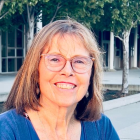Support strong Canadian climate journalism for 2025
These in-their-own-words pieces are told to Patricia Lane and co-edited with input from the interviewee for the purpose of brevity.
Charlotte Taylor tells hopeful stories about the real impacts of climate change. This 21-year-old University of British Columbia undergraduate student has been selected for a Climate Storytelling Fellowship as part of UBC’s 2024 Communicating Climate Hope conference. Charlotte co-ordinates the Climate Justice Study Collective at the UBC Centre for Climate Justice, provides administrative assistance and communications support to Dr. Pasang Yangjee Sherpa’s Knowledge Justice Collective and serves as co-editor in chief for the UBC Journal for Climate Justice.
Tell us about the fellowship program.
We learn to tell hopeful stories about our changing climate to challenge the dominant narrative that we are doomed and there is nothing we can do about it. As a first step, we are learning skills and finding tools to help us tell better, more accurate, more hopeful stories. Next, we will tell our own story. Finally, we will integrate our own stories with those of others working toward a better future. These sessions culminate in a two-day Communicating Climate Hope conference in August, bringing faculty, students, community advocates and educators together to learn from each other. The conference will be simulcast in Tilburg, Netherlands and available on Zoom, as well as in-person.
What is the Knowledge Justice Collective project?
I am part of a team analyzing major scientific assessment reports published by the United Nations’ International Panel on Climate Change (IPCC) and providing a critical lens for climate change decision-makers. We provide authors with data on the extent and type of Indigenous knowledge foregrounded and make recommendations as to how to more meaningfully engage with Indigenous climate leaders and Indigenous materials.
Tell us about the Climate Justice Study Collective.
The Climate Justice Study Collective aims to build connections and prompt reflection and strategizing among climate justice activists and practitioners within and outside UBC. This study collective takes up the pressing question: what national climate policy agendas would strengthen and advance international solidarity for political freedom and decolonization while also advancing just climate futures in Canada?
How did you get interested in telling climate stories?
I have always loved books and took a job in high school at the library downtown in my home city, Nanaimo, B.C. Like most people, I thought a library was for borrowing books. But I saw that it served many other functions, especially for vulnerable community members. For example, during extreme heat or terrible storms, a library is often an essential shelter for unhoused people. For those without a computer, it provides access to online job searches and medical information. I thought the lack of dedicated resources for these communities was very unfair and joined the Fridays for Future group.
While I liked being able to participate in protests and other actions, I needed to write. I became a guest contributor for a youth-led journal published by Starfish Canada.
That led me to choose a thematic, interdisciplinary study of “climate change in media” at UBC but I also wanted to be active in the community, so I joined other groups. Storytelling is best done on a background of lived experience, and we need good stories to work well together in the movement.

What makes your work hard?
I know that my stories often don’t reach decision-makers because I am discounted for being young. It is frustrating that separate agendas, even inside the climate movement, keep us from working together. It is scary that decision-makers are resistant to the kinds of transformative change we so badly need.
I also worry about our current tendency to polarize issues which we need to work together to resolve.
What gives you hope?
We use a term “messy hope” at the UBC Climate Hub. Hope is a discipline. It takes effort and repeated attempts to make progress. I get messy hope from seeing so much inspiring work being done by grassroots leaders, especially in marginalized communities, on issues such as food security and energy sovereignty.
What do you see if we get this right?
A more equitable, more just world that provides a livable future for those who are most vulnerable.
What would you like to say to other young people?
There is a lot of pressure to push down our eco-anxiety and not feel things. Strong emotions like anger and rage can be harnessed for good work. They are not always destructive.
What about older readers?
It feels like a burden when you tell us that young people today make you feel hopeful. We need you to help. We need you to use your time, money and networks and we need your guidance and wisdom.







Comments
wonderful thoughtful work - thanks to the Climate Hub people and for this report.
Unfortunately missing from this piece is the sad fact that the UBC Climate Hub is in a precarious situation - they have had their funding slashed in half and are at risk of being defunded entirely. Anyone interested in supporting them in their efforts to meet with the new UBC President should consider signing their petition, which can be found at a link on this site: https://linktr.ee/ubcclimatehub